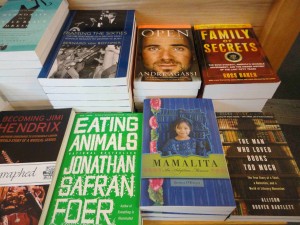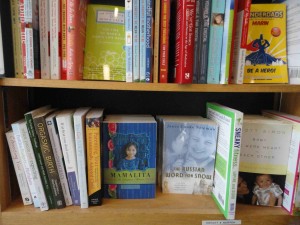As many of us who follow international adoption know, Ethiopia is on the verge of becoming the largest sending country of orphans to the United States. It is also being used as a model of “fair” adoption practices. This comprehensive article by David Crary of the Associated Press outlines reasons why.
Adoptions from Ethiopia rise, bucking global trend
By DAVID CRARY (AP) –
NEW YORK — As the overall number of international adoptions by Americans plummets, one country — Ethiopia — is emphatically bucking the trend, sending record numbers of children to the U.S. while winning praise for improving orphans’ prospects at home.
It’s a remarkable, little-publicized trend, unfolding in an impoverished African country with an estimated 5 million orphans and homeless children, on a continent that has been wary of international adoption.
Just six years ago, at the peak of international adoption, there were 284 Ethiopian children among the 22,990 foreign kids adopted by Americans. For the 2010 fiscal year, the State Department projects there will be about 2,500 adoptions from Ethiopia out of fewer than 11,000 overall — and Ethiopia is on the verge of overtaking China as the top source country.
The needs are enormous; many of Ethiopia’s orphans live on the streets or in crowded institutions. There’s constant wariness, as in many developing countries, that unscrupulous baby-sellers will infiltrate the adoption process.
However, a high-level U.S. delegation — led by Sen. Mary Landrieu, D-La., and Susan Jacobs, the State Department’s special adviser on children’s issues — came back impressed from a visit to Ethiopia last month in which they met President Girma Wolde-Giorgis.
“What’s encouraging is they want to work with us, they want to do it right,” Jacobs said in a telephone interview. “Other countries should look at what Ethiopia is trying to do.”
The global adoption landscape has changed dramatically since 2004. China, Russia and South Korea have reduced the once large numbers of children made available to foreigners while trying to encourage domestic alternatives. There have been suspensions of adoptions from Guatemala, Vietnam and Nepal due to fraud and corruption.
In contrast, Ethiopia has emerged as a land of opportunity for U.S. adoption agencies and faith-based groups. Several have been very active there in the past few years, arranging adoptions for U.S. families while helping Ethiopian authorities and charitable groups find ways to place more orphans with local families.
Buckner International, a Dallas-based Christian ministry, has about three dozen Ethiopian children lined up for adoption by U.S. parents, but it’s also engaged in numerous programs to help Ethiopia build a domestic foster care system.
In one village visited by Jacobs and Landrieu, Buckner has built a school and housing for teachers while beginning a slow assessment of the orphan population to determine which children can be cared for locally and which might benefit from U.S. adoption.
Randy Daniels, Buckner’s vice president of international operations, said the children who do head to adoptive families in the United States generally seem to flourish.
“They’re some of the warmest, most loving kids of any I’ve worked with in the world,” he said. “It’s amazing to how quickly they adjust to the families stateside, to the language, the culture.”
Buckner’s clients include David McDurham and his wife, Amy, of Mansfield, Texas, who adopted their daughter, Ella, from Ethiopia in 2008 and are preparing to pursue a second Ethiopian adoption. Unable to have a biological child, the McDurhams had been considering adopting from China. But that can now be a four-year process, and they became increasingly intrigued by Africa.
“They were just opening up the Ethiopia program,” said McDurham, a Baptist minister. “We were thinking, where did the needs of children and our needs coincide?”
McDurham said Ella, who just turned 3, is thriving in their Dallas suburb. They’ve become popular customers at a local Ethiopian restaurant and have forged ties with several other families who adopted from Ethiopia.
“We want her to see other families like hers — to know other people who have that same story,” McDurham said,
Other agencies active in Ethiopia — both with adoptions and developing local alternatives for orphans — include Bethany Christian Services and the Gladney Center for Adoption.
Gladney only registered with Ethiopian authorities in 2005 and since then has completed nearly 500 adoptions by U.S. families. J. Scott Brown, Gladney’s managing director of African programs, said the agency also is working with government-run orphanages in Ethiopia, trying to improve living conditions and develop job-training programs to benefit youths who won’t move to homes abroad.
“There are still some bad players in Ethiopia who need to be removed,” he said. “But if we can work closely with the government, this can be a leader for other countries to follow.”
Some Ethiopian officials remain skeptical of international adoption, but Brown said he’s seen doubters won over after visiting the United States to view firsthand how Ethiopian children are thriving in adoptive homes.
Landrieu, one of the leading adoption advocates in Congress, said Ethiopia deserves praise — compared with many developing countries — for recognizing that its orphans would be better off in a family environment such as foster care or an adoptive home rather than in an institution.
But resources are limited. She said there was only one judge assigned to process adoption cases and make sure that children are indeed legitimate candidates.
Heather Paul of SOS Villages-USA, which runs overseas programs supporting orphans and abandoned children, said it’s critical that potential adoptions be closely scrutinized.
“Having better regulations protects American adoptive parents too,” she said. “There’s no worse heartbreak than finding a child had been sold away.”
In contrast to Ethiopia, there’s uncertainty and frustration over adoption developments in two other countries.
In Kyrgyzstan, the government suspended adoptions in 2008 because of suspected corruption, leaving more than 60 U.S. families with pending adoptions in limbo. Plans to resume the process have been disrupted by recent political upheaval, though Jacobs said she remains hopeful that a new adoption law could be passed whenever a newly elected parliament is able to convene.
Adoptions of abandoned children from Nepal have been suspended by the U.S. government until Nepalese authorities implement procedures to curtail corruption and mismanagement. Jacobs said 80 pending U.S. adoptions are under review by the State Department.
The suspension has been criticized by some U.S. adoption advocates.
“When you close a country, you end up causing more problems than you prevented,” said Chuck Johnson, CEO of the National Council for Adoption. “What happens to the kids who aren’t adopted in Nepal? Some will end up as prostitutes and slaves.”
___
State Department: http://www.adoption.state.gov/
Buckner International: http://www.beafamily.org/country-ethiopia.shtml
Copyright © 2010 The Associated Press. All rights reserved.
http://www.google.com/hostednews/ap/article/ALeqM5hWMUqkB5ZIgjSZRtjsnBfsWLOn0QD9IQAD0O0?docId=D9IQAD0O0


 ShareThis
ShareThis



 ShareThis
ShareThis


